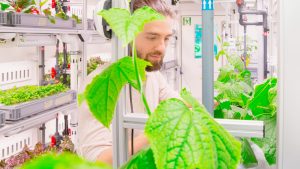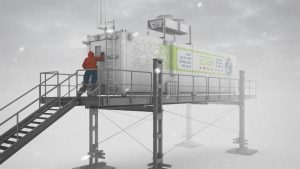
A scientist inspects plants in the EDEN ISS greenhouse. Photo: DLR, CC-BY 3.0
How do you grow vegetables in Antarctica? In a seriously high-tech greenhouse, that’s how.
The EDEN ISS greenhouse, designed by the German Aerospace Center (DLR) and international partners, is a self-sufficient plant-growing system with a host of high-tech features. Mounted on a high platform and entered by a special airlock, this is nothing like the greenhouse in your garden.
EDEN ISS is designed to grow plants in inhospitable environments without soil or life-giving sunlight. To allow them to grow without soil, the plants are automatically sprayed at regular intervals with a water-nutrient mixture. Special lamps, temperature control and air filters all provide just the right conditions for tomatoes, peppers, cucumbers and more.
A trial run in Bremen (Germany) earlier this year produced a rich harvest of fresh vegetables and herbs, and now the aim is to test crop cultivation in the hostile conditions of the Antarctic winter.

EDEN ISS greenhouse in the Antarctic. Photo: DLR, CC-BY 3.0
The EDEN ISS container set off on its 11-week journey from the Port of Hamburg to the Ekström ice shelf on 8 October 2017. Its final destination is Neumayer Station III, run by the Alfred Wegener Institute (AWI).
So why put so much effort into cultivating fresh fruit and vegetables in harsh climate conditions? There are two main reasons.
Firstly, to address future needs on Earth in the face of a rapidly growing world population and the impacts of climate change on food production. Secondly, to develop methods to provide fresh plant foods for human spaceflight, including future missions to the Moon and Mars.
Starting in December, DLR scientist Paul Zabel will spend a year at Neumayer III running the greenhouse and taking care of the plants. As well as providing important insights for scientific research, it will also put tasty fresh vegetables on the table for the research station team!
Read the DLR press release here and check out the dedicated EDEN ISS website here.
